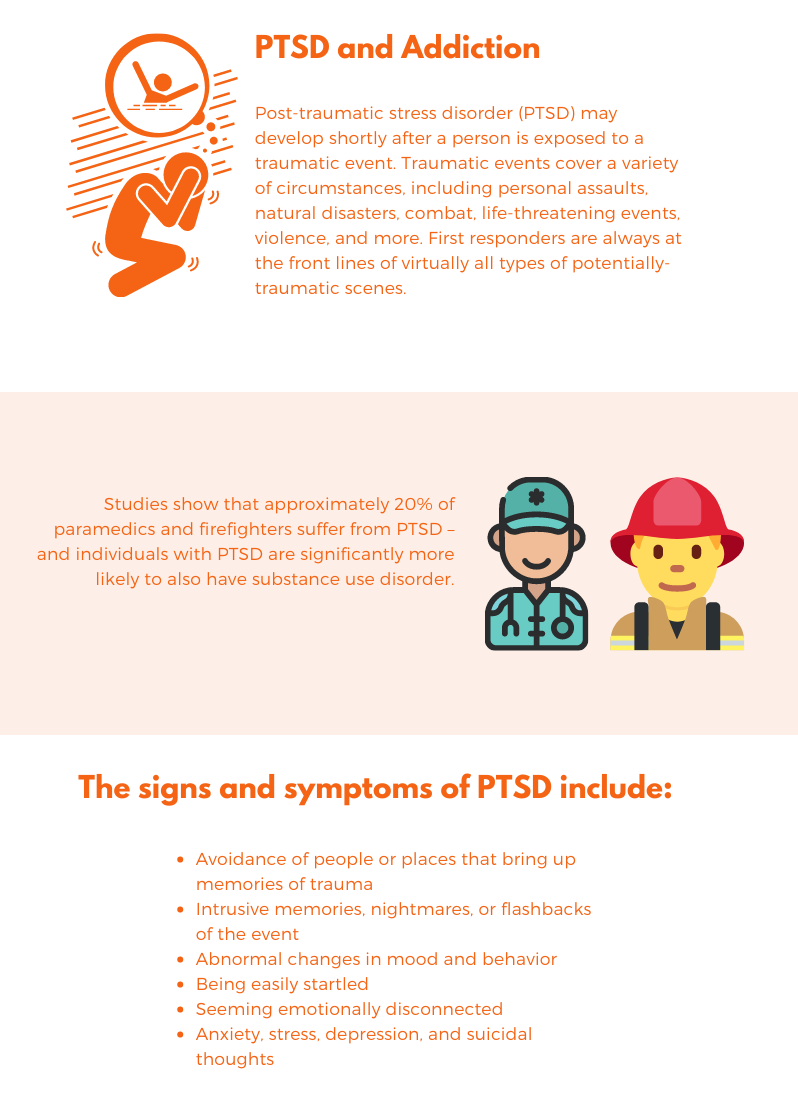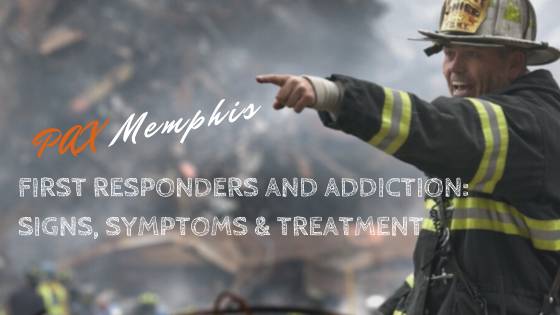First responders experience addiction at staggering rates. These careers are rewarding, and certainly essential to our society, but they are also extremely challenging. Whether a person is a firefighter, EMT, police officer, or paramedic, he or she may turn to substances to cope with difficult situations and traumas that occur due to the nature of these careers. These honorable individuals are the first to respond in the event of natural disasters, violent crimes, medical emergencies, and more. First responders often work long hours and struggle to maintain a healthy work-life balance. Instead, they turn to unhealthy coping mechanisms, like drug or alcohol abuse. Consequently, it’s important to recognize and treat the mental health of these men and women.
The Correlation Between First Responders, PTSD, and Addiction
There’s a lot of stress that comes with first responder jobs – so many people think it’s acceptable for these individuals to have a drink at the end of a long shift. However, alcohol or drug abuse alike isn’t a healthy way to deal with stress. Drinking is also socially acceptable among people in these positions, so alcohol is used for socialization as well. Lastly, the immense stress and anxiety from work and exposure to traumatic scenes expose people to situations that can lead to PTSD – a common precursor to addiction and alcoholism among first responders.
PTSD and Addiction

These symptoms make day to day life difficult and have many negative effects on one’s overall well-being. When addiction or alcoholism comes into play, it makes things even more difficult for the individual.
Substance Abuse and Addiction Among First Responders
First responders may develop an addiction for other reasons than PTSD. For example, long hours, working with and tending to people with mental health conditions, and personal issues are known to lead to high rates of mental health disorders and substance abuse among emergency responders. First responders are highly susceptible to anxiety, depression, and even other conditions like insomnia. Unfortunately, alcohol and drugs are sometimes used to mask these symptoms and help people cope.
Consider the following statistics to better understand the relationship between first responders and addiction.
- Between 20-30% of police officers are estimated to have a substance use disorder.[3]
- Approximately 10% of firefighters abuse drugs and 29% have had problems with alcohol.[4]
- Among paramedics, 72% suffer from sleep deprivation, 20% suffer from PTSD, and 36% suffer from depression – all factors that contribute to drug and alcohol abuse.
Signs of Substance Abuse
There are many ways to tell if someone is abusing drugs or alcohol, including physical and psychological symptoms of substance abuse. Furthermore, regardless if a person is a first responder or a regular citizen, the signs and symptoms of addiction are the same. Some signs of substance abuse and addiction include:
- Dilated or constricted pupils
- Changes in appearance (weight, acne, skin tone, eyes, etc.)
- Impaired coordination and decision making
- Changes in energy, mood, appetite, sleep patterns, or behaviors
- Increase in risky behaviors
- Isolating from family and friends
- Having trouble at work, school, or home
- Spending excess money on drugs or alcohol
- Lying to cover up substance abuse
If this sounds like you or a loved one, you can benefit from drug and alcohol rehab.
Treating Addiction in Emergency Responders
Treating addiction and alcoholism among first responders is similar to regular treatment programs. However, many programs for emergency responders have a strong focus on mental health and co-occurring disorders. Addiction treatment for paramedics, firefighters, and police officers consists of drug/alcohol detox, group therapy, 12-step facilitation programs, individual therapy, family therapy, and more. Individuals who suffer from co-occurring disorders benefit most from inpatient rehab programs that are specified to meet their unique needs. Treatment for first responders is significantly beneficial when individuals join a support group upon leaving rehab.
Seeking treatment isn’t easy – especially when stigma surrounds addiction and you are seen as a hero in your local community. While you are used to taking care of others, you must take time to care for yourself as well. The long hours, stressful situations, and traumatic experiences faced by emergency responders take a toll on their mental health and may push individuals to pursue drug or alcohol abuse. If you or a loved one is a first responder who suffers from addiction, you aren’t alone. Reach out to an addiction specialist at PAX Memphis to learn about our drug and alcohol addiction treatment options for first responders.
References:
Medically Reviewed: September 25, 2019

All of the information on this page has been reviewed and verified by a certified addiction professional.










